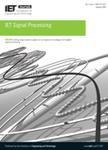版权所有:内蒙古大学图书馆 技术提供:维普资讯• 智图
内蒙古自治区呼和浩特市赛罕区大学西街235号 邮编: 010021

作者机构:Tatung Univ Dept Elect Engn Taipei Taiwan
出 版 物:《IET SIGNAL PROCESSING》 (IET Signal Proc.)
年 卷 期:2007年第1卷第2期
页 面:66-72页
核心收录:
主 题:frequency response finite impulse response filter Digital signal processing Filtering methods in signal processing delay filters minimax optimality Signal processing theory Interpolation and function approximation (numerical analysis) least squares approximations frequency response weighting function WLS method variable fractional delay FIR filters equiripple filters FIR filters iterative method weighted least squares near-equiripple approximation
摘 要:The weighted least squares (WLS) method is a well-known method for designing a finite impulse response (FIR) filter. And some authors have reported that if a suitable frequency response weighting function is used to design the filter, the WLS method can produce an equiripple result. However, the weighting function for minimax optimality of WLS design is hard to derive analytically. By an iterative method with an adjustable elaborately constructed weighting function, this idea is extended to design a near-equiripple variable fractional delay FIR filter. The proposed method is superior to the fixed-weighting WLS design in the peak absolute error by about 6.6874 dB. The algorithm converges very rapidly. From the simulation, it typically produces a design which is only about 1 dB away from the truly equiripple solution in two iterations and converges to within 0.0056 dB in eight iterations.